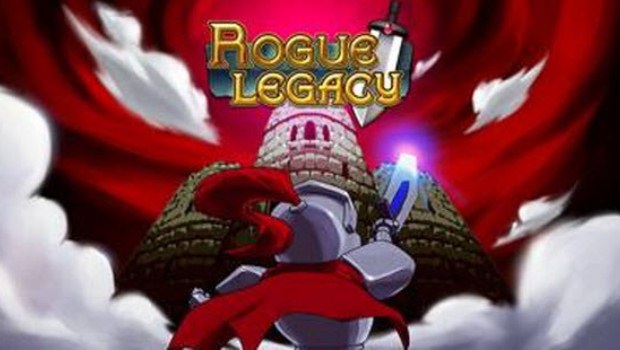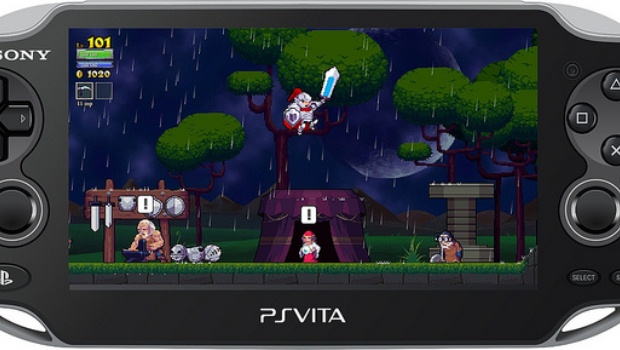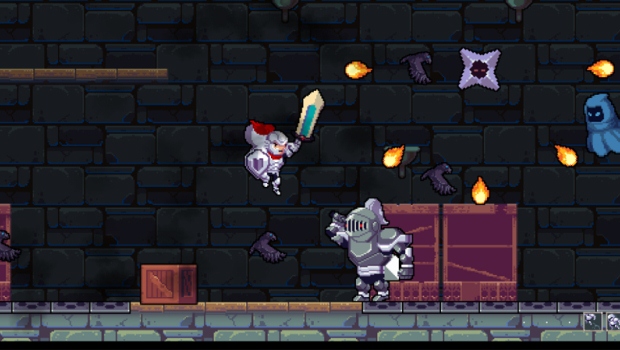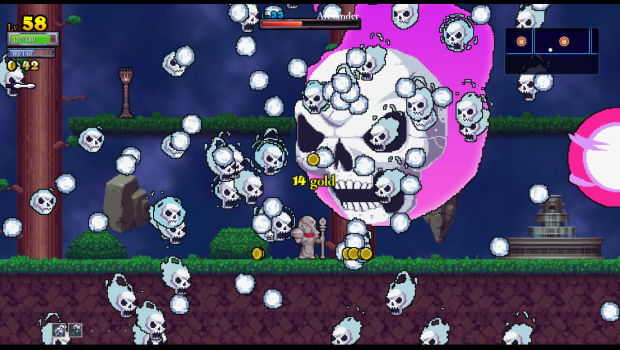Last summer’s Rogue Legacy was a delight: a cute little indie game that charmed gamers into playing it, and then punished them mercilessly for doing so. I didn’t fall into the trap until last fall, when Steam (whose name I curse every time a big sale event rolls through) knocked 66% of the price off. Being as our editor-in-chief Chris Scott spoke so highly of it I gave it a go.
My problem with Rogue Legacy, at the time, was that I was playing a platformer with a keyboard. I’m sorry, but that is not a proper way to play a devilish game like Rogue Legacy. But, I did it anyways. I spent an entire weekend home alone with no wife or kids playing this brutal platformer, and still enjoyed it despite playing the game “the wrong way.”
I caught wind this game was coming to the Playstation family sometime in 2014, so I set it aside and bided my time. When Rogue Legacy finally arrived, I was a little worried some of the charm would have worn off being as this would be my second time playing. Lucky for me, the joyful, brutal experience is still intact.
Let me rewind just a moment in case you have no idea what Rogue Legacy is and didn’t click the link above to read Chris’ initial thoughts (tsk tsk). Rogue Legacy reminds me of a constantly shifting Castlevania game with a progression system that makes players want to play more. I run up to the castle gate, pay my fee which varies depending on your progression tree, and make a run through a new layout of the castle hoping to get either more gold or beat one of the bosses.
The trick is, each run varies based on which character I picked. Obviously, I’m not going to go try to beat a boss with a miner, whose gold collecting skill helps character advancement. There are a handful of characters, and the player only gets to pick one of three random choices to advance with that particular life. The basics are collect gold, level up your character and repeat. As simple as it sounds, it’s a perfect formula for quick burst gaming or long sittings.
There are four main areas in the game, each having a large gap in difficulty. As soon as I was comfortable with the manor (the starting area) and could make good runs, I decided to venture into the forest area. I quickly died. The enemies are progressively more difficult and even though they look similar to enemies in the previous area, their attacks are changed enough to throw complacent gamers off.
If leveling up and retro gameplay wasn’t enough to woo me, I love the equipment in the game. I feel like I have to mention it every time developers take the time to make armor noticeably look different as I collect new pieces, and Rogue Legacy does just that. It’s actually a pet peeve of mine when I collect new weapons or armor and I look exactly the same as before.
Last year, the game was great, and was in my top 10 list of 2013. On the Playstation Vita, like many other darling indie games that make the transition from PC to Vita, Rogue Legacy feels right at home. The colors pop, the controls are spot on, and each short life is a potential stopping point. Except it’s not, because just like on the PC, I found it hard to actually stop playing after just a short amount of time. I can’t help it, just a few minutes doesn’t feel like enough. I would make one run, spend my gold on some new advancement, and want to see if I could get more or get farther.
The Playstation version has a few new traits for the characters, too. They are miniscule in the grand scheme of things, but it was nice that the devs wanted to add a little spice to the game.The two more stand out additions to the game are cross buy and cross save. The cross buy options makes me able to play between three systems (PS4, PS3 and Vita) with one purchase. It’s something Sony has been, and should continue to, take advantage of giving gamers.
The other upgrade is cross-save. This is a little trickier, because on paper, it sounds awesome. While it is very, very good, Rogue Legacy tends to save itself automatically at random intervals. So it might save half way into a run, and when you die, it doesn’t save at the main menu. I only personally used the feature a few times, but only because I preferred to play on my handheld as opposed to the big screen. I felt like it looked better and handled tighter on the Vita.
Rogue Legacy coming to the Playstation family is nothing but a good thing. I know a lot of people who don’t do PC gaming at all, and they missed out on this gem last year. Now, they can finally experience what all of the fuss was about. And now, I can finally play Rogue Legacy with a controller. I still suck at the game, but love it all the same.
This review was based on review code provided by the publisher, with gameplay on the Playstation Vita and Playstation 3 systems. For more on our review policies, please read here.



